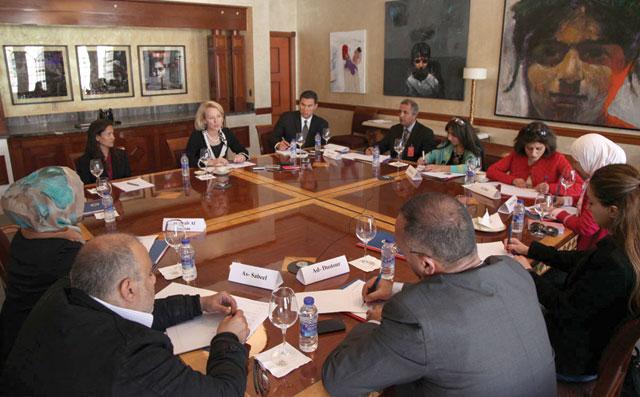You are here
Jordanian-US cooperation never been closer — ambassador
By Khetam Malkawi - Mar 31,2015 - Last updated at Mar 31,2015

AMMAN — The US is working with Jordan to prioritise the Kingdom’s request for military equipment to ensure that it will not run short in the war against terrorism, Alice G. Wells, the US ambassador in Amman said on Tuesday.
“When it comes to military cooperation between the US and Jordan, our military cooperation has never been closer… we are working together intensively to ensure that Jordan’s leadership of this Arab coalition is not impeded by a shortage or lack of supplies,” Wells said at a press meeting.
Responding to questions about military cooperation between the two countries as Jordan is currently a member of the international coalition that is fighting Daesh and of the Arab coalition fighting Houthis in Yemen, the US envoy noted that her country works with Jordan in order to prioritise its request for equipment, as Jordan has dropped six times as much ordnance in this war as the next Arab coalition partner.
“It’s been a very active partner, and certainly it is an ongoing contribution to the coalition. This participation requires that it [Jordan] has enough supplies,” the diplomat said, adding that for this purpose, top US officials came from Washington to meet with Jordanian counterparts to go through and determine priorities and identify funding resources to move forward.
She explained that the US updates the Jordanian government on a weekly basis on the status of weapon deliveries and “yesterday [Monday] we had the opening of the joint military commission”, the annual gathering where officials from both sides look for five-year strategic forecast and deal with very specific issues of military support.
“The bottom line when it comes to military cooperation between the US and Jordan, our military cooperation has never been closer.”
Currently, America is providing Jordan with $300 million a year in military assistance and “we expect this to grow in next year’s budget but the final allocations have not been determined yet”.
Elaborating further on bilateral ties, the envoy said: “Jordan is at the intersection of all of our efforts… the peace process, Syria, Iraq, counter-terrorism and most recently in Yemen.”
According to Wells, consultations between US leaders and His Majesty King Abdullah are crucial to US policy and “our understanding how best we can move forward in the region”.
The ambassador said that $3 billion worth of assistance has been stipulated in a three-year memorandum of understanding signed between the two countries. In addition, there is a third loan guarantee for Jordan with the final details being worked out and with expectations that this loan guarantee would be issued in June.
The US is also taking another step in the Kuwait conference to reinforce its commitment to standing by Jordan as it faces the repercussions of the Syrian refugee crisis, according to Wells, who added that in the Kuwait conference, America is pledging $507 million in assistance, bringing “our total contribution to the refugee crisis to $3.7 billion”. Of that, $556 million, separate from the bilateral assistance programme, has been spent inside Jordan for Syrians.
“The message I heard when I was doing my consultations in Washington was that we are standing by Jordan and we are mutually committed, and have mutual strategic interest in defeating Daesh and that Jordan is the Arab leader that is driving this coalition and providing the essential ideological alternative to the destructive forces of Daesh,” the envoy said.
“So we are committed to Jordan’s success and we are committed to helping Jordan find the space in the resources necessary to continue its process of modernisation…”
Regional issues
As for the war against Houthis in Yemen, the US announced it will provide logistics and intelligence support for the operation in addition to technical support.
Regarding the Mideast peace process, the ambassador said the US administration was deeply concerned by the statements that emerged during the Israeli election campaign and the walking back of a commitment to the two-state solution.
However, she noted Israeli Premier Benjamin Netanyahu’s remarks (that there would be no Palestinian state) were taken out of context and that he still supports the two-state solution. “Let us look at the actions,” she said.
Related Articles
AMMAN (JT) — The Royal Air Force on Tuesday received two Blackhawk helicopters (UH60-M) from the US.A ceremony was held at at the Marka Mili
AMMAN — King’s Military Adviser and Chairman of the Joint Chiefs-of-Staff Gen.
AMMAN — King’s Military Adviser and Chairman of the Joint Chiefs-of-Staff Gen.
















